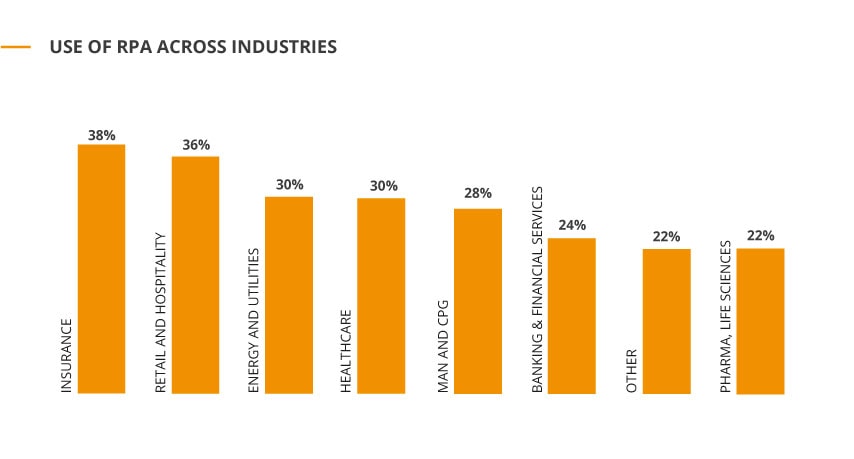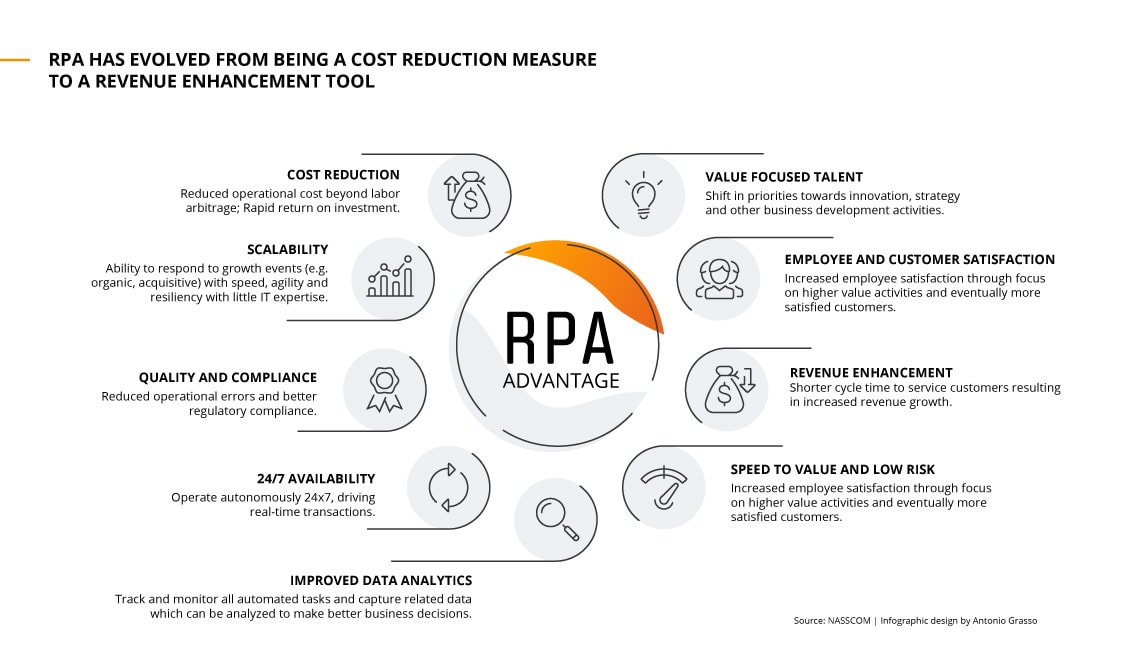
The complete guide to RPA services
RPA, or Robotic Process Automation, is a key element when it comes to digital transformation of businesses and organisations, no matter where they are and what they do. Let’s dive into this new world of automation to understand why it is so useful.
What are RPA Services?
RPA (Robotic Process Automation) is a technology which allow organisations to use automation to perform some routine tasks.
RPA software takes advantage of a combination of integrations, advanced technologies (such as automation and machine learning), and cognitive processes. It can be used to perform simple tasks such as automatic email response, as well as for complex jobs, undertaken by thousands of bots at the same time.
RPAaaS (Robotic Process Automation as a service) is an outsourced, cloud-based service, which comprises of deploying software robots dealing with those repetitive tasks without any involvement on the clients’ part.
Recent statistics on the state of RPA implementation show that 78% of those who have already implemented RPA expect to significantly increase investment in RPA over the next three years. Clearly, there is a lot to do, and the appetite is huge. Let’s see why.
How do RPA Services work?
RPA services have a great impact on the way businesses transform and develop. Using complex technologies software robots can navigate systems, identify data, and perform a vast number of actions, which emulate those done by humans. As robots, they can do them faster and more consistently than people, they do not make mistakes, do not get tired and don’t need to go on holiday. They don’t get distracted by Facebook and don’t need any additional motivation to work.
RPA process benefits for enterprise
Instead of hiring new people to do simple jobs or asking highly skilled professionals to do repetitive tasks and therefore wasting their talent, it is much better to adapt RPA and make use of it in everyday work. Employees who are freed of boring and easy jobs can focus on driving innovation to the business and finding new solutions to make it more successful.
The main benefits of RPA processes for enterprises include:
- increased effectiveness,
- increased efficiency,
- increased productivity,
- increased clients’ satisfaction level,
- reduced costs and increased revenues,
- improvement of the quality and quantity of work,
- better compliance,
- speeding up the process of digitalisation.
RPA – the best solutions for enterprise businesses
Research shows that RPA services are used globally by about 53% of different businesses. It is estimated that within the next five years almost all companies will be using some kind of automation, depending on their needs, size and industry they are in.
Some of the best RPA tools to use are Automation Anywhere, Eggplant or Outsystems, but the options are endless. The decision on which of them to choose should depend on many different factors such as the type of your organisation and the way you work.
How to choose the best RPA tool? Start with research. That’s done, compare different options and check their cons and pros. To decide on the right RPA tool, it is crucially important to know what you want to achieve and what kind of investment you want to make. It may be a good idea to think about using a BPM software, which allows to identify, monitor, and change some processes to make sure businesses operate at the highest level and keep improving.
Top RPA success stories
RPA is being implemented in all industries and there are some good RPA success stories across all sectors.
A good example of using RPA in banking is the improvement of the credit limit extension process. With hundreds of credit limit extension requests received by banks daily, RPA in a form of cash credit and overdraft facility helped them achieve 100% accuracy and improve productivity by 91.67%.
Another area where financial services make use of RPA on daily basis is the customer service around ATM disputes. Robotic Process Automation reduced the ATM dispute resolution time from 48 hours to 2 hours per case, making it much more customer friendly.
A great example of using Robotic Process Automation in retail is Walmart. The company uses over 500 bots to automate tasks like answering questions, retrieving information from audit documents, and identifying slow-moving items and deadstock.
In healthcare, RPA is being used to achieve better compliance and improve data security, which is key, given the amount of sensitive data the sector deals with.
Keen to know more about RPA?
Thinking about implementing it within your company to take it to the next level? Get in touch with our specialists – we will be more than happy to help!










